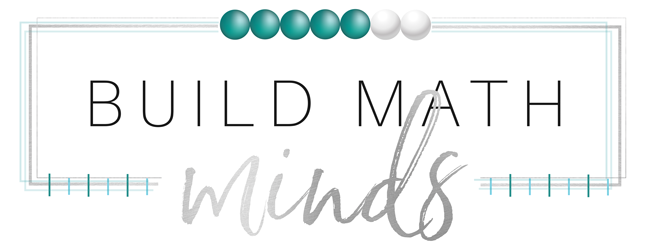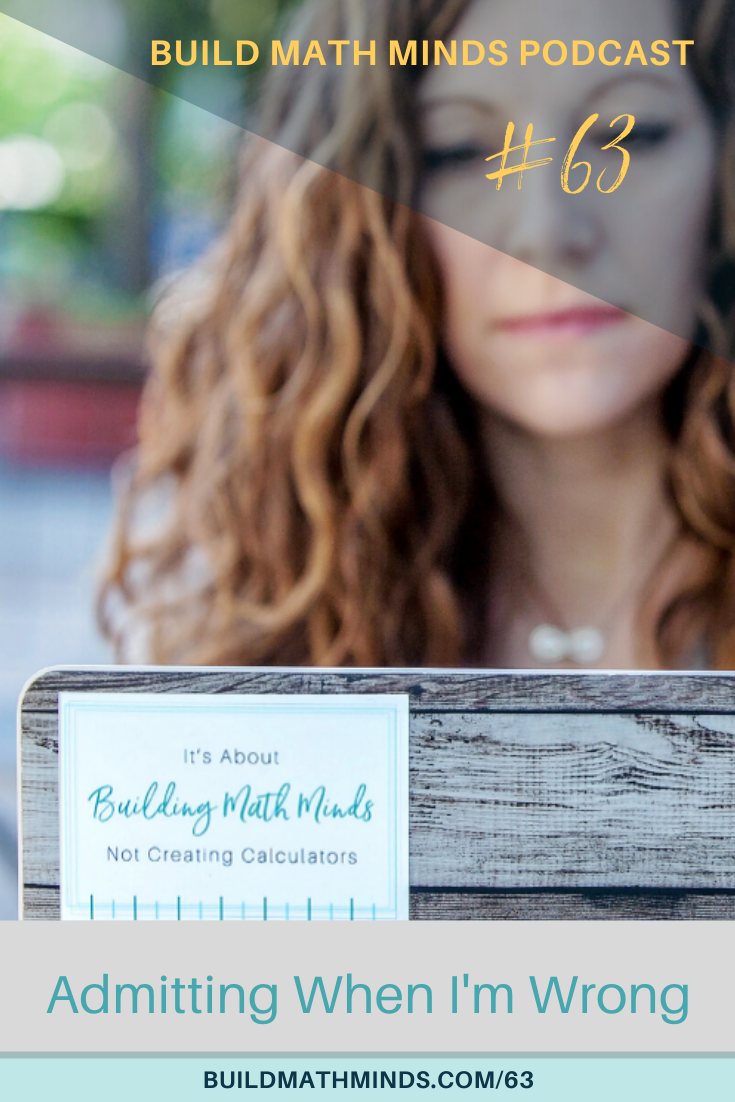Resources mentioned in this episode:
Teaching After The Coronavirus Shutdown video
Teaching Student-Centered Mathematics: Developmentally Appropriate Instruction for Grades PreK-2 by John Van de Walle, Karen Karp, LouAnn Lovin, and Jennifer Bay-Williams
Teaching Student-Centered Mathematics: Developmentally Appropriate Instruction for Grades 3-5 by John Van de Walle, Karen Karp, LouAnn Lovin, and Jennifer Bay-Williams
Teaching Student-Centered Mathematics: Developmentally Appropriate Instruction for Grades 6-8 by John Van de Walle, Jennifer Bay-Williams, LouAnn Lovin, and Karen Karp
Welcome fellow Recovering Traditionalists to Episode 63. Today I am Admitting When I’m Wrong.
Last week over on my vlog TheRecoveringTraditionalist.com, I talked about Teaching After The Coronavirus Shutdown. One of the things I recommended in that video was not using your textbook when you start teaching next year. Anytime I say things about not using a textbook I always get pushback. Yes there is research to show that fidelity to textbooks breeds good test scores, but it also breeds kids who hate math and whole list of things that I could go on and on about.
However, I need to admit that I am wrong because it really isn’t the textbook that I don’t like and that is causing all those things….it’s how we use that textbook. We’ve all seen it. Maybe you’ve even been that teacher. I know I was. I think back to how I taught before I learned about Cognitively Guided Instruction and how kids develop their math understandings. I approached and used my textbook way differently before that than how I used my textbook after.
The textbook didn’t change. My knowledge about how to build students’ understanding did and that impacted how I used the activities that were in my textbook.
But it isn’t just the activities in the textbook. It’s all activities that we need to be mindful about how we put them to use in our classroom. I was reminded of this as I was re-reading through the book Teaching Student-Centered Mathematics: Developmentally Appropriate Instruction for Grades 3-5 by John Van de Walle, Karen Karp, LouAnn Lovin, and Jennifer Bay-Williams.
Even though I was reading the 3rd-5th grade version, there is also a PreK-2 and a 6th-8th grade version and all of them have the same Chapter 1 about Teaching for Understanding. In that chapter I was reminded about an article by Richard Skemp from 1978 that brought about the idea of teaching for Relational Understanding (which helps kids build relationships between math concepts and really understand why a concept works) or teaching for Instrumental Understanding (which gets kids to learn a concept but it is in isolation and is only getting kids to produce an answer to a problem).
I’ll do a podcast about that article later, but in the chapter in Teaching Student-Centered Mathematics, they describe a lesson where a 4th grade teacher is trying to help kids understand multi-digit multiplication and the difference in the lesson when a teacher is building Relational Understanding and when the teacher is building Instrumental Understanding. I’m not going to go into detail about the examples, if you have the book you can read the examples on pages 6-9 (and remember each grade band book has examples that pertain to their age and content).
What I want to talk about was that neither example of the lessons was a lesson from a textbook.
They were both what people might consider a hands-on lesson, with kids drawing the area model on graph paper but how it was facilitated by the teacher was what made the difference.
As I said I’ll do a separate podcast about Relational and Instrumental Understanding, but today I wanted to admit that maybe it isn’t the textbook that I want you to not use next school year.
I really don’t care what you use for your lessons, but I DO want to encourage you to focus on building Relational Understanding and NOT Instrumental Understanding with your students next year. You have so many kids that will be coming back to school with different abilities and mathematical understanding that trying to teach Instrumental Understanding makes mathematics seem overwhelming and isolated: there’s too much to teach in a given school year.
But when you focus on trying to build Relational Understanding, you will see all those math concepts you need to teach next year as a connected web of understanding that you get to help kids build. When you focus on building connections it seems less overwhelming, and makes mathematics more fun & engaging. Kids start to see all the connections between the things they’ve learned in previous years with the things they are learning this year.
I hope you don’t take away from this that I am bashing you as a teacher. That is not my intent. I’m calling this out because I know that I did it myself. I followed my textbook lesson by lesson, teaching each concept as isolated skills and procedures that kids needed to master. I did that because I personally didn’t know how math concepts were related. I only had Instrumental Understanding of math, so I couldn’t build Relational Understanding for my students because I didn’t have it for myself.
So as you start to think about what teaching math is going to look like next year it really isn’t about dumping your textbook. It’s about looking at your textbook through a new lens. I want you to focus on the major concepts at your grade level and work to build that Relational Understanding around those concepts. I talked about this in the video I did about teaching after the shutdown.
Don’t’ forget that i f you want to read those examples of Relational and Instrumental Understanding go get the Teaching Student-Centered Mathematics book for your grade level. That book is the one I call my Math Bible. It is full of general math teaching ideas, but also gives detailed information and activities about the math content kids need to understand at your grade level….and in a way that will help you build Relational Understanding and not Instrumental Understanding.
Stay safe and stay mentally healthy.
Subscribe and Review in iTunes
Hey, are you subscribed to the Build Math Minds Podcast, yet? If you’re not, make sure to do that today because I don’t want you to miss any episodes! Click here to subscribe to the podcast in iTunes.
While you’re there, don’t forget to leave a review on iTunes too. I would love to know your thoughts and how we can make sure that we give you content that you will really enjoy.
To leave a review, head over to iTunes and click on “Ratings and Reviews” and “Write a Review.” I can’t wait to hear your thoughts about the podcast.





Christina, I just listened to your Podcast #63, having received your email about it. The title was intriguing, of course, so I had to listen right away! I have agreed with you on not using a textbook as the main tool in the math classroom. Even after your “apologetic” podcast, I feel the same way, and I kind of think you really do, too. I got scolded a couple years ago when my brother and his wife came over and viewed my kitchen counter. Now he’s no mathematician, but his almost angry immediate response was, “It’s all wrong. You can’t do it that way. It has to be linear.” What he meant, of course, is that I did not have a nice lineup of items on the counter from left to right. My niece Mary, when she was a child, used to come over, and my Mom and I would give her something to do, like arrange the holiday items on a table or shelf, And sure enough, at Easter time, she would put all the bunnies in a straight line, left to right, as if it were a parade. It was linear!!!! This was so cute, but it definitely reminds me of the typical Math Textbook. It is linear., You do chapter 1 before chapter 2, chapter 2 before chapter 3, etc. Within a chapter, you proceed similarly. You do lesson 1.1,, then 1.2, then 1.3, then 1.4, etc. Maybe there’s an optional section at the end that you can (or do) skip, but don’t you dare go to chapter 2. Now each chapter might have a theme, like money or sports or food or shopping, which was nice, but mathematically it was all linear. And how “interesting” it was when one such book had Volume of a Cylinder in the chapter BEFORE finding the area of a circle! But the typical Math text is just that: LINEAR. If you’re on Chapter 2, don’t you dare look at Chapter 5. That’s cheating (like reading a novel and flipping to the back to see how it ends.) When I teach prime factorization, I want to follow up with how that affects fractions changing to decimals. When I teach area of a convex polygon, I want to link it not only to the formula but to other ways to find the area, such as Pick’s Theorem or the Shoelace Formula or breaking up the inside. And that’s just referring to obvious connections. But I also want to have units that connect math to art, math to writing, math to whatever their main hobby is. So I want them to do projects 100% outside the textbook box: Marilyn Burns’ Color Tile Project; Marcy Cook’s Number Tile Riddles that tie so many topics together. Transformational designs that tie in Geometry to whatever interests them. And open-ended problems. None of this comes from a textbook. The book Mathematics A Human Endeavor, meant for “General Math” students, was an amazing book that should be used for all. The point is that when you commit the mortal sin of teaching math out of order, you have the possibility to teach it efficiently, you teach it for understanding, you teach it for remembering, you uncover the magic of math,! You open up the opportunity for students to develop that magical number sense that you want them to catch!
Christina, in my opinion, no apology was needed. However, I know what you’re going through when text books are mentioned. I too teach math conceptually and get push back from coworkers AND parents.(I teach fourth grade). It’s a struggle every year. It gets heated sometimes with parents, but I stand firm on the conceptual strategies. Proof that it is the correct way to teach is when students/teachers in middle/junior high come back to/or come visit to thank me for my approach to mathematics. So, I take my textbooks from administration, smile, say thank you, go on my merry way KNOWING that I’m not goi bc to use them! I love your blog, videos and book references! Don’t be deterred! Terri💕